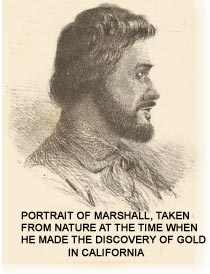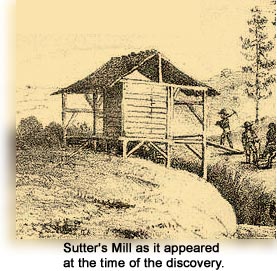 14 Lithographic Views
of the California Gold Rush 1850-1857
14 Lithographic Views
of the California Gold Rush 1850-1857
in PowerPoint (900 Kb)
"The Gold Discovery," by John Sutter
Excerpts from John Sutter's Diary
1838-1848
An Eyewitness to the Gold Discovery
A Rush to the Gold Washings — From the California
Star
Military Governor Mason's Report on the Discovery of
Gold
William T. Sherman and the Gold Rush
Dramatic Impact of the Gold Discovery, by Theo. H.
Hittell
The Discovery — as Viewed in New York and
London
Ulysses S. Grant and the Gold Rush
Gold Rush and Anti-Chinese Race Hatred
Gold Mining Terms and Methods
Other Museum Gold Rush Items
California Gold Rush Chronology 1846 — 1849
California Gold Rush Chronology 1850 — 1851
California Gold Rush Chronology 1852 — 1854
California Gold Rush Chronology 1855 — 1856
California Gold Rush Chronology 1857 — 1861
California Gold Rush Chronology 1862 — 1865
Steamer Day in the 1850s
Sam Brannan Opens New Bank — 1857
|
Capt. Sutter's account
of the first discovery of the Gold.
"I was sitting one afternoon," said the Captain, "just after my siesta, engaged, by the bye, in writing a letter to a relation of mine at Lucern, when I was interrupted by Mr. [James] Marshall, a gentleman with whom I had frequent business transactions – bursting hurriedly into the room. From the unusual agitation in his manner I imagined that something serious had occurred, and, as we involuntarily do in this part of the world, I at  once glanced to see if my rifle was in its proper place. You should know that the mere appearance of Mr. Marshall at that moment at the Fort, was quite enough to surprise me, as he had but two days before left the place to make some alterations in a mill for sawing pine planks, which he had just run up for me, some miles higher up the Americanos [American River]. When he had recovered himself a little, he told me that, however great my surprise might be at his unexpected reappearance, it would be much greater when I heard the intelligence he had come to bring me. 'Intelligence,' he added, 'which if properly profited by, would put both of us in possession of unheard-of-wealth – millions and millions of dollars, in fact.' I frankly own, [words missing in typecript] when I heard this that I though something had touched Marhsall's brain, when suddenly all my misgivings were put at an end to by his flinging on the table a handful of scales of pure virgin gold. I was fairly thunderstruck and asked him to explain what all this meant, when he went on to say, that according to my instructions, he had thrown the mill-wheel out of gear, to let the whole body of water in the dam find a passage through the tail race, which was previously to narrow to allow the water to run of in sufficient quantity, whereby the wheel was prevented from efficiently performing its work. By this alteration the narrow channel was considerably enlarged, and a mass of sand and gravel carried of[f] by the force of the torrent. Early in the morning after this took place, Mr. Marshall was walking along the left Bank of the stream when he perceived something which he at first took for a once glanced to see if my rifle was in its proper place. You should know that the mere appearance of Mr. Marshall at that moment at the Fort, was quite enough to surprise me, as he had but two days before left the place to make some alterations in a mill for sawing pine planks, which he had just run up for me, some miles higher up the Americanos [American River]. When he had recovered himself a little, he told me that, however great my surprise might be at his unexpected reappearance, it would be much greater when I heard the intelligence he had come to bring me. 'Intelligence,' he added, 'which if properly profited by, would put both of us in possession of unheard-of-wealth – millions and millions of dollars, in fact.' I frankly own, [words missing in typecript] when I heard this that I though something had touched Marhsall's brain, when suddenly all my misgivings were put at an end to by his flinging on the table a handful of scales of pure virgin gold. I was fairly thunderstruck and asked him to explain what all this meant, when he went on to say, that according to my instructions, he had thrown the mill-wheel out of gear, to let the whole body of water in the dam find a passage through the tail race, which was previously to narrow to allow the water to run of in sufficient quantity, whereby the wheel was prevented from efficiently performing its work. By this alteration the narrow channel was considerably enlarged, and a mass of sand and gravel carried of[f] by the force of the torrent. Early in the morning after this took place, Mr. Marshall was walking along the left Bank of the stream when he perceived something which he at first took for a  piece of opal, a dark transparent stone, very common here – glittering on one of the spots laid bare by the suddenly crumbling away of the bank. He paid not attention to this, but while he was giving directions to the workmen, having observed several similar glittering fragments, his curiosity was so far excited, that he stooped down and picked one of them up. 'Do you know,' said Mr. Marshall to me, 'I positively debated within myself two or three times whether I should take the trouble to bend my back to pick up one of the pieces and had decided on not doing so when farther on, another glittering morsel caught my eye – the largest of the pieces now before you. I condescended to pick it up, and to my astonishment found that it was a thin scale of what appears to be pure gold.' He then gathered some twenty or thirty pieces which on examination convinced him that his suppositions were correct. His first impression was, that this gold had been lost or buried there, by some early Indian tribe – perhaps some of those mysterious inhabitations of the west, of whom we have no account, but who dwelt on this continent centuries ago, and built those cities and temples, the ruins of which are scattered about these solidary wilds. On proceeding, however, to examine the neighboring soil, he discovered that it was more or less auriferous. This at once decided him. He mounted his horse, and rode down to me as fast as it could carry him with the news. piece of opal, a dark transparent stone, very common here – glittering on one of the spots laid bare by the suddenly crumbling away of the bank. He paid not attention to this, but while he was giving directions to the workmen, having observed several similar glittering fragments, his curiosity was so far excited, that he stooped down and picked one of them up. 'Do you know,' said Mr. Marshall to me, 'I positively debated within myself two or three times whether I should take the trouble to bend my back to pick up one of the pieces and had decided on not doing so when farther on, another glittering morsel caught my eye – the largest of the pieces now before you. I condescended to pick it up, and to my astonishment found that it was a thin scale of what appears to be pure gold.' He then gathered some twenty or thirty pieces which on examination convinced him that his suppositions were correct. His first impression was, that this gold had been lost or buried there, by some early Indian tribe – perhaps some of those mysterious inhabitations of the west, of whom we have no account, but who dwelt on this continent centuries ago, and built those cities and temples, the ruins of which are scattered about these solidary wilds. On proceeding, however, to examine the neighboring soil, he discovered that it was more or less auriferous. This at once decided him. He mounted his horse, and rode down to me as fast as it could carry him with the news.
"At the conclusion of Mr. Marshall's account, and when I had convinced myself, from the specimens he had bought with him, that it was not exaggerated, I felt as much excited as himself. I eagerly inquired if he had shown the gold to the workpeople at the mill and was glad to hear that he had not spoken to a single person about it. We agreed not to mention the circumstances to any one, and arranged to set off early the next day for the mill. On our arrival, just before sundown, we poked the sand about in various places, and before long succeeded in collecting between us more than an ounce of gold, mixed up with a good deal of sand. I stayed at Mr. Marshall's that night, and the next day we proceeded some little distance up the south Fork and found that gold existed along the whole course, not only in the bed of the main stream, where the [water] had subsided but in every little dried-up creek and ravine. Indeed, I think it is more plentiful in these latter places, for I myself, with nothing more than a small knife, picked out from [a] dry gorge, a little way up the mountain, a solid lump of gold which weighted nearly an ounce and a half.
"Notwithstanding our precaution not to be observed, as soon as we came back to the mill we noticed by the excitement of the working people that we had been dogged about, and to complete our disappointment, one of the Indians who had worked at the gold mine in the neighborhood of La Paz cried out in showing us some specimens picked up by himself, – Oro! – Oro – Oro!!! –"
Letter sheet: Lith. & pub. by Britton & Rey, San Francisco, Cal. 1854
Return to the top of the page.
|